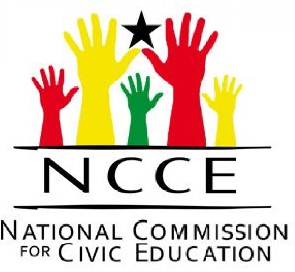 The National Commission for Civic Education (NCCE) logo
The National Commission for Civic Education (NCCE) logo
The National Commission for Civic Education (NCCE) has called on Ghanaians to get involved in the planning and execution of developmental projects in their communities to ensure value for money delivery.
They must also use social auditing as a monitoring exercise to systematically assess the progress of development programmes within their communities for accelerated development.
Mr Ebenezer Tetteh-Wayo, NCCE Metropolitan Director explained during a social auditing workshop organized at Bubuashie in Accra to educate the people to be active participants in national development.
The NCCE Social Auditing exercise falls under the Accountability, Rule of Law and Anti-Corrupt Programme, (ARAP) funded by the European Union to empower members of the community to hold authorities accountable for mismanagement of resources.
It is a multi-pronged approach to identify community needs and promoting community ownership.
Mr Tetteh-Wayo said social auditing had its origin in the democratic values and principles of transparency and accountability, stressing that “it helps to measure, understand, report and improve a development project.
He said community participation in development projects through social auditing medium ensures that the voice of all stakeholders, including; the marginalized and the poor.
He said Ghanaians must adopt to the use of social auditing as it provided the strongest and irrefutable direct evidence for inputs, processes, financial and physical reporting, compliance, physical verification, assurance against utilization of resources and assets created while implementing a development programme.
Mr Tetteh-Wayo, said the programme sought to encourage residents to take up challenges facing the community and help find solutions to solve the problems affecting the community. He added that the community awareness through social auditing also aimed at empowering traditional, and religious leaders, opinion and civil society actors to power to partake in decision making and their role as citizens to promote development.
The programme identified some problems of the community such as poor sanitation, poor roads and poor drainage system.
He encouraged the community members to focus on the implementation stage of a project, the audit agency should identify major issues to be covered under social audit.
“Broadly, these issues are around equity, transparency, accountability, awareness, impact and quality, and responsiveness of the project,” he said.
A seven-member Community Monitoring Committee with Naa Bosaafi Ahanta I, Queenmother of Bubuashie was set-up.